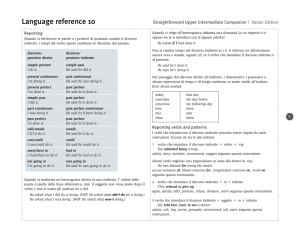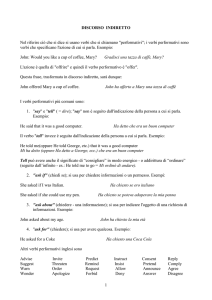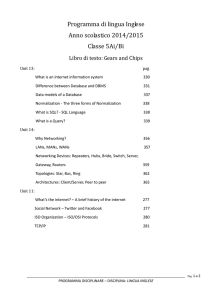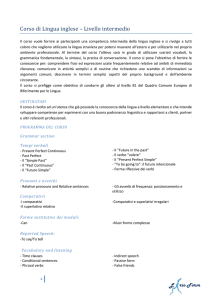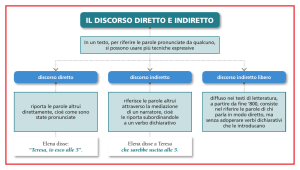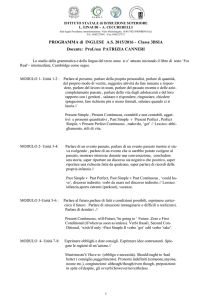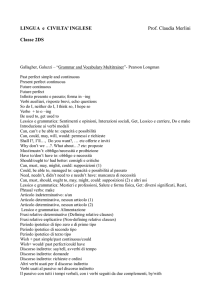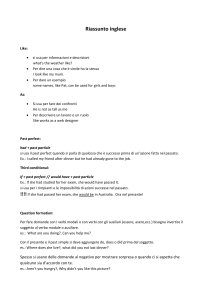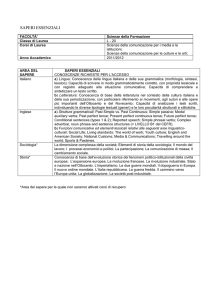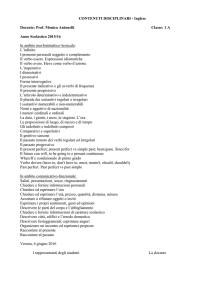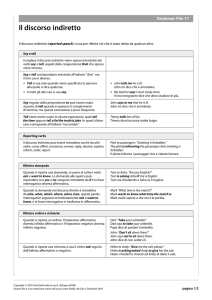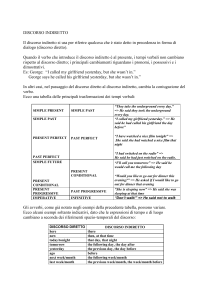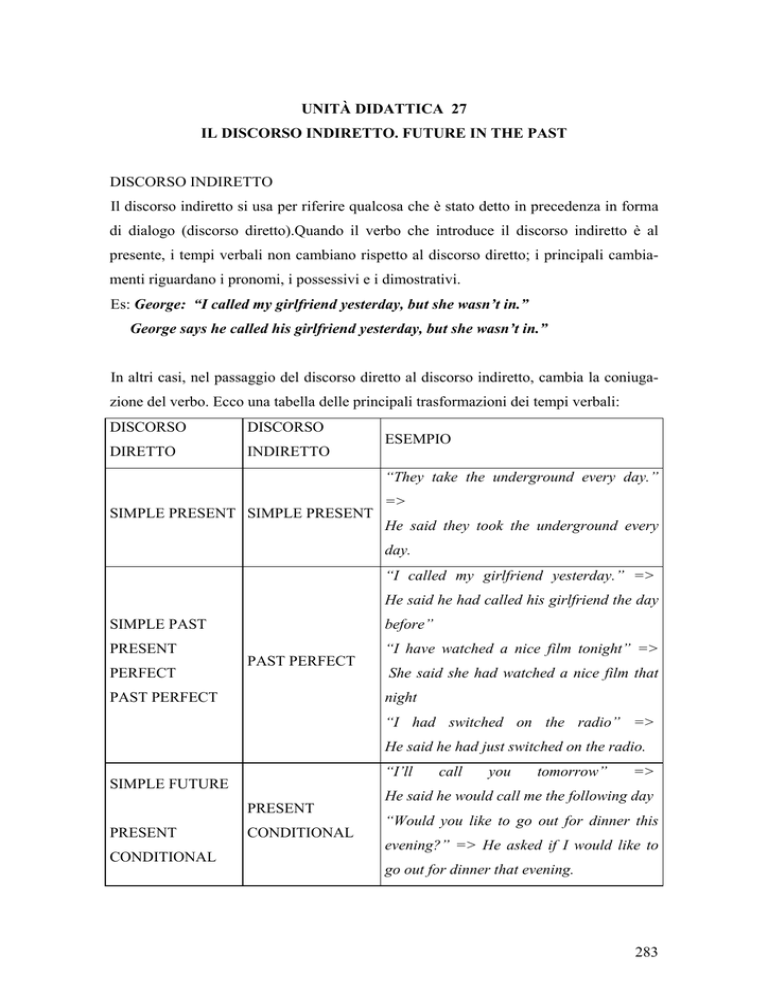
UNITÀ DIDATTICA 27
IL DISCORSO INDIRETTO. FUTURE IN THE PAST
DISCORSO INDIRETTO
Il discorso indiretto si usa per riferire qualcosa che è stato detto in precedenza in forma
di dialogo (discorso diretto).Quando il verbo che introduce il discorso indiretto è al
presente, i tempi verbali non cambiano rispetto al discorso diretto; i principali cambiamenti riguardano i pronomi, i possessivi e i dimostrativi.
Es: George: “I called my girlfriend yesterday, but she wasn’t in.”
George says he called his girlfriend yesterday, but she wasn’t in.”
In altri casi, nel passaggio del discorso diretto al discorso indiretto, cambia la coniugazione del verbo. Ecco una tabella delle principali trasformazioni dei tempi verbali:
DISCORSO
DISCORSO
DIRETTO
INDIRETTO
ESEMPIO
“They take the underground every day.”
SIMPLE PRESENT SIMPLE PRESENT
=>
He said they took the underground every
day.
“I called my girlfriend yesterday.” =>
He said he had called his girlfriend the day
SIMPLE PAST
PRESENT
PERFECT
before”
PAST PERFECT
PAST PERFECT
“I have watched a nice film tonight” =>
She said she had watched a nice film that
night
“I had switched on the radio” =>
He said he had just switched on the radio.
“I’ll
SIMPLE FUTURE
PRESENT
PRESENT
CONDITIONAL
CONDITIONAL
call
you
tomorrow”
=>
He said he would call me the following day
“Would you like to go out for dinner this
evening?” => He asked if I would like to
go out for dinner that evening.
283
PRESENT
PAST
“She is sleeping now” => He said she was
PROGRESSIVE
PROGRESSIVE
sleeping at that time
IMPERATIVE
INFINITIVE
“Don’t walk!” => He said not to walk
Gli avverbi, come già notato negli esempi della precedente tabella, possono variare.
Ecco alcuni esempi soltanto indicativi, dato che le espressioni di tempo e di luogo
cambiano a seconda dei riferimenti spazio-temporali del discorso:
DISCORSO DIRETTO
DISCORSO INDIRETTO
Here
There
Now
Then, at that time
Today/tonight
That day, that night
Tomorrow
The following day, the day after
Yesterday
The previous day, the day before
Ago
Before
Next week/month
The following week/month
Last week/month
The previous week/month, the week/month before
Per introdurre un discorso indiretto si usano di solito i verbi SAY, TELL e ASK:
− SAY se non è espressa la persona con cui si parla ES: He said he had called his
girlfriend the day before Anche se l’uso non è comune, SAY può essere usato
anche quando è espressa la persona con cui si parla; in tal caso il complemento
di termine deve essere preceduta da TO ES: He said to me he had called his
girlfriend the day bifore.
− TELL se è espressa la persona con cui si parla ES: He told me he had called his
girlfriend the day before.
− ASK per riferire una domanda .
284
Es: He asked if I would like to go out for dinner that evening.
Cambiamenti di tempo nel discorso indiretto
Direct Speech
Reported Speech
Present Simple
Past Simple
Present Continuous
Past Continuous
Past Continuous
Past Perfect Continuous
Present Perfect
Past Perfect
Past Simple
Past Perfect
Past Perfect
Past Perfect
Will
Would
Going to
Was going to
Can
Could
285
Test
1. Indica se la frase è giusta o meno.
1. I told "goodbye" to John but he just ignored me completely.
True
False
2. Mike told me to come and see you immediately.
True
False
3. Say "goodnight" to your uncle and then we can go.
True
False
4. Helen told me about your broken leg. How did that happen?
True
False
5. I told that I didn't want to go the same restaurant again.
True
False
6. What did she tell her mother?
True
False
286
7. What did she say to her mother?
True
False
8. What did she say her mother?
True
False
9. John said a terrible joke at the party and no-one laughed - except him of course!
True
False
10. Kathy told her turn the television on so she could watch her favourite soap opera.
True
False
3. Traduci le seguenti frasi.
a) Patrizia mi chiese se avevo scritto un nuovo capitolo del romanzo storico.
b) Nicola avvisò Maria Luisa che non avrebbe potuto uscire con lei la sera dopo.
c) Marco disse che stava completando la raccolta di favole.
d) Io avevo pensato che Alessandro sarebbe potuto partire con Lucia la settimana
successiva
e) Katia disse a Luca che avrebbe dovuto comportarsi meglio.
f) Il professore di tecnica chiese a Eugenio se poteva prestargli il suo righello.
g) Non avevamo pensato che Isabella si sarebbe attardata così tanto.
h) Rossella ci avvisò che non sarebbe riuscita a correggere in tempo l’esercizio di
grammatica tedesca.
i) Andrea suggerì a Roberta di imparare a memoria il terzo capitolo del libro di
storia.
287
j)
La direttrice avvisò Alessio che lo avrebbe punito se non fosse arrivato puntuale
a scuola.
k) Faisal e Sheida decisero che si sarebbero sposati entro la fine dell’estate.
l)
Anna e Vittoria dissero agli studenti che dovevano restare in aula a finire
un’esercitazione.
m) Letizia avvisò i suoi genitori che si sarebbe dovuta assentare da casa per qualche giorno.
n) Tiziana chiese ad alcuni studenti se potevano completare il foglio con la
composizione e consegnarlo alla bidella.
o) Giorgio non disse mai a Maria Teresa se aveva davvero copiato il compito di
matematica.
p) Barbara, Ilaria e Matteo avvisano che dovranno lavorare spesso al computer e
che non potranno fare lezione per una quindicina di giorni.
q) Tu dicesti a Giuliana e Giovanna che Alice non aveva studiato una parola di
latino e greco.
r)
Daniele e Mike sostenevano che Claudio non avrebbe dato alcun esame fino a
luglio.
s)
Avete chiesto a Elena e a Michela se erano state alla festa per i 30 anni di
Isabella la settimana precedente?
t)
Martina e Nicoletta si domandano sempre se Nicola prenderà una seconda
laurea e se conosce bene le lingue straniere.
……………………………………………………………………………………
……………………………………………………………………………………
……………………………………………………………………………………
……………………………………………………………………………………
……………………………………………………………………………………
……………………………………………………………………………………
……………………………………………………………………………………
……………………………………………………………………………………
……………………………………………………………………………………
……………………………………………………………………………………
288
……………………………………………………………………………………
……………………………………………………………………………………
……………………………………………………………………………………
……………………………………………………………………………………
……………………………………………………………………………………
……………………………………………………………………………………
289

